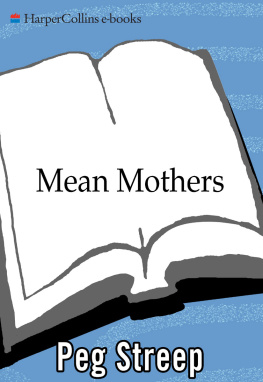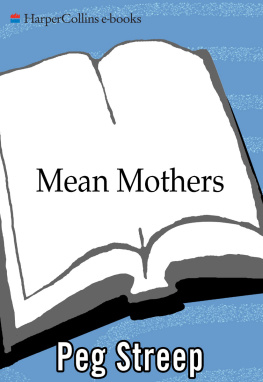Elena Ferrante
Troubling Love
My mother drowned on the night of May 23rd, my birthday, in the sea at a place called Spaccavento, a few miles from Minturno. In the late fifties, when my father was still living with us, we rented a room in a farmhouse in that very area and spent the month of July there, the five of us sleeping in a few burning-hot square meters. Every morning we girls drank a fresh egg, headed to the sea among tall reeds on paths of dirt and sand, and swam. The night my mother died, the owner of that house, who was called Rosa and by now was over seventy, had heard someone knocking at the door but, fearing thieves and murderers, didnt open it.
My mother had taken the train for Rome two days earlier, on May 21st, but had never arrived. Lately, she had been coming to stay with me at least once a month for a few days. I didnt like hearing her in the house. She woke at dawn and, as was her habit, cleaned the kitchen and living room from top to bottom. I tried to go back to sleep, but couldnt: rigid between the sheets, I had the impression that as she bustled about she transformed my body into that of a wizened child. When she came in with the coffee, I huddled to one side so that she wouldnt touch me as she sat down on the edge of the bed. Her sociability irritated me: she went shopping and got to know shopkeepers with whom in ten years I had exchanged no more than a word or two; she took walks through the city with casual acquaintances; she became a friend of my friends, and told them stories of her life, the same ones over and over. I, with her, could only be self-contained and insincere.
At the first hint of impatience on my part, she returned to Naples. She gathered her things, gave a last tidying up to the house, and promised to be back soon. I went through the rooms rearranging according to my taste everything she had arranged according to hers. I put the saltshaker back on the shelf where I had kept it for years, I restored the detergent to the place that had always seemed to me convenient, I made a mess of the order she had brought to my drawers, I re-created chaos in the room where I worked. And in a little while the odor of her presence a scent that left in the house a sense of restlessness faded, like the smell of a passing shower in summer.
It often happened that she missed the train. Usually she arrived on the next one or even the next day, but I couldnt get used to it and so I worried just the same. I telephoned her anxiously. When I finally heard her voice, I reproached her with a certain harshness: why hadnt she departed, why hadnt she warned me? She apologized unremorsefully, wondering with amusement what I imagined could have happened to her, at her age. Everything, I answered. I had always pictured a weft of traps, woven purposely to make her vanish from the world. When I was a child, I would spend the time of her absences waiting for her in the kitchen, at the window. I longed for her to appear at the end of the street like a figure in a crystal ball. I breathed on the glass, fogging it, in order not to see the street without her. If she was late, the anxiety became uncontainable, overflowing into tremors throughout my body. Then I ran to a storeroom, without windows or light, right next to her and my fathers room. I closed the door and sat in the silent dark, crying. The little room was an effective antidote. It inspired a terror that kept at bay my anxiety for the fate of my mother. In the pitch-blackness, suffocating because of the smell of DDT, I was attacked by colored shapes that grazed the pupils of my eyes for a few seconds and left me gasping. When you get back Ill kill you, I thought, as if it were she who had left me shut up in there. But then, as soon as I heard her voice in the hall, I quickly slipped out and went to hover near her, with an air of indifference. That storeroom came to my mind when I discovered that she had left at the normal time but had never arrived.
In the evening I got the first phone call. My mother said in a calm voice that she couldnt tell me anything: there was a man with her who was preventing her. Then she started laughing and hung up. At first what I mainly felt was bewilderment. I thought she was joking, and resigned myself to wait for a second phone call. In fact I spent hours in conjectures, sitting vainly beside the telephone. Finally, after midnight, I turned to a friend who was a policeman: he was very kind and told me not to get upset, he would take care of it. But the night passed without news of my mother. The only certainty was her departure: Signora De Riso, a widowed neighbor about the same age, with whom for fifteen years she had had alternating periods of friendliness and hostility, had told me on the telephone that she had gone with my mother to the station. While my mother stood in line to buy a ticket, the widow had bought her a bottle of water and a magazine. The train was crowded but my mother had found a place anyway, next to the window, in a compartment jammed with soldiers on leave. They had said goodbye, warning each other to be careful. How was she dressed? In the usual way, in clothes she had had for years: blue skirt and jacket, a black leather purse, old, low-heeled shoes, a worn suitcase.
At seven in the morning my mother telephoned again. Although I assailed her with questions (Where are you? Where are you phoning from? Who are you with?), she confined herself to reeling off, in a loud voice, a series of obscene expressions in dialect, uttering each one with enjoyment. Then she hung up. Those obscenities caused in me a disorienting regression. I telephoned my friend again, astonishing him with a confused mixture of Italian and expressions in dialect. He wanted to know if my mother had been particularly depressed recently. I didnt know. I admitted that she wasnt the way she used to be calm, gently amused. She laughed for no reason, she talked too much; but old people often act like that. My friend agreed: as soon as the weather turned warm, old people were constantly doing odd things; there was nothing to worry about. But I continued to worry, and walked all over the city, searching in the places where I knew she liked to walk.
The third phone call came at ten at night. My mother spoke incoherently about a man who was following her so that he could take her away wrapped in a carpet. She asked me to come quickly and help her. I begged her to tell me where she was. She changed her tone, said that it was better not to. Lock yourself in, dont open to anyone, she advised me. The man wanted to harm me, too. Then she added: Go to sleep. Im going to have a bath now. There was nothing more.
The next day two boys saw her body floating a few yards from the shore. She was wearing only her bra. Her suitcase wasnt found. Her blue suit wasnt found. Her underwear, her stockings, her shoes, her purse, with her papers, werent found. But on her finger she still had her engagement ring and her wedding ring. In her ears were the earrings that my father had given her nearly half a century earlier.
I saw the body, and, faced with that livid object, felt that I had better grab onto it in order not to end up in some unknown place. It hadnt been assaulted. It showed only some bruises, a result of the waves that, though gentle, had pushed her all night against some rocks at the edge of the water. It seemed to me that around her eyes she had traces of heavy makeup. I observed for a long time, uneasily, her legs, olive-skinned, and extraordinarily youthful for a woman of sixty-three. With the same uneasiness I realized that the bra was very different from the shabby ones she usually wore. The cups were made of finely worked lace and revealed the nipples. They were joined by three embroidered Vs, the signature of a Neapolitan shop that sold expensive lingerie for women, that of the Vossi sisters. When it was given to me, along with her earrings and her rings, I sniffed it for a long time. It had the sharp odor of new fabric.












